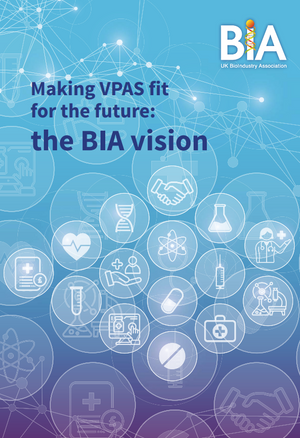Making VPAS fit for the future: the BIA vision
The next Voluntary Pricing and Access Scheme (VPAS) currently being negotiated is taking place in a significantly changed health policy context to all previous schemes. Not only has the current scheme resulted in a globally unprecedented rebate rate for many firms, this is the first VPAS to be negotiated post Brexit with the UK having decided to become a sovereign regulatory system for a market that is around 3% of global sales by value.

The 'Making VPAS fit for the future: the BIA vision' report finds that the 2019 VPAS scheme hasn't lived up to many of its original ambitions of delivering three main objectives:
- To improve patients’ access to cost-effective medicines and streamline routes to market
- To improve health outcomes by increasing patient access to medicines
- To encourage an environment to grow the life sciences industry and position the UK as an attractive destination for investment, particularly post-Brexit.
However, in reality:
- NICE thresholds have not been fundamentally reviewed in over 20 years.
- The UK’s share of global R&D investment is falling
- Industry bears 100% of the financial risk
- The uptake of new medicines continues to be far below the European average
- R&D, clinical trial and manufacturing investment is moving to the USA and China
- The UK is significantly uncompetitive compared to EU and global counterparts.
The BIA believes the 2019 Scheme has delivered a highly inequitable outcome for the industry despite the significant contribution made by the life sciences sector to supporting COVID-19 recovery. For example, clawback payment rates are higher in the UK than in any other EU country. The DHSC has confirmed that the VPAS payment percentage for 2023 will be set at 26.5%. This is a significant rise from the last year’s rate of 15% and much higher than comparable EU countries, where rates are between 7.5%-12%. In addition, in the UK, industry bears 100% of the financial risk for clawback payments, unlike Italy and Spain where risk is shared more proportionally with payers.
Recommendations
In considering this evidence and the importance of the strategic relationship between government and the life sciences sector, the BIA has proposed a series of ‘partnership principles’ for industry-government collaboration to help foster a spirit of problem-solving. The BIA therefore, believes a reset is needed in the relationship between government and industry which will deliver both taxpayer value and a fair return for innovators. The BIA therefore recommends:
- Financial controls should be more predictable, equitable and competitive
- VPAS should be a mutually beneficial partnership that realises value for both parties
- Health technology assessment methods should be genuinely reviewed.
.png)
.png)